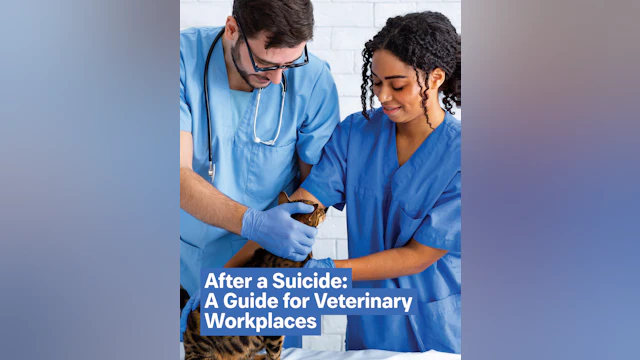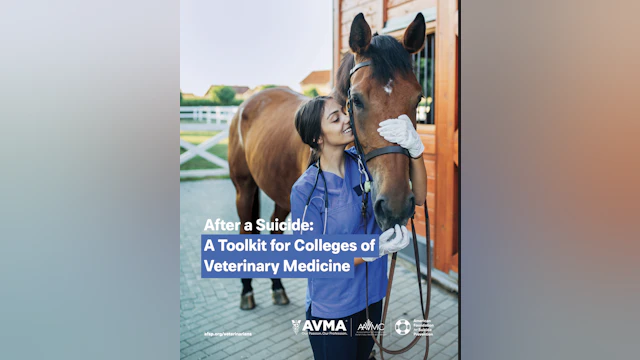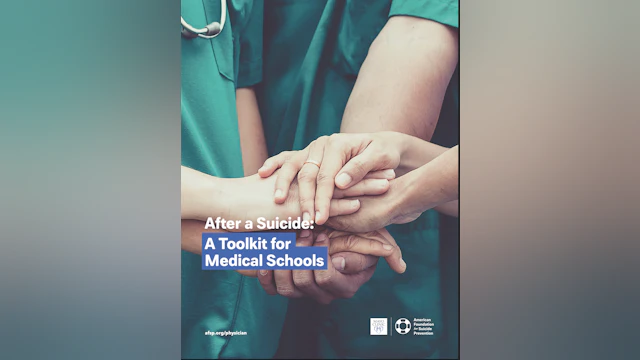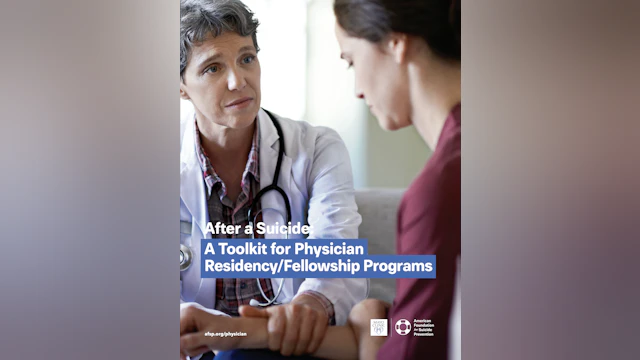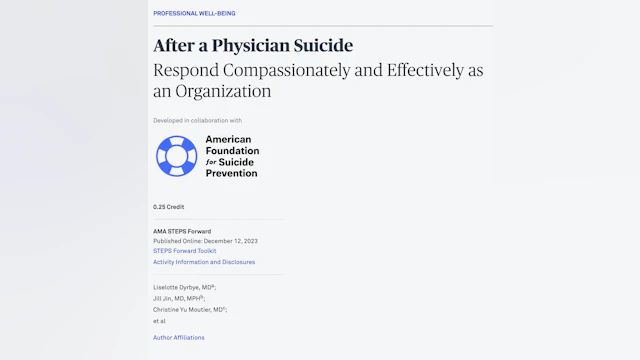Healthcare Professionals' Mental Health and Suicide Risk
AFSP is focused on offering evidence-informed programs and resources and supporting public policies to prevent suicide and support healthcare professionals.
Healthcare professionals who are proactive about their own health — both physical and mental — protect their ability to maintain optimal, safe patient care. Real and perceived barriers lead many health professionals to avoid addressing their own mental health needs all too often. Disproportionate numbers of health professionals experience burnout, depression and other forms of distress, and are at increased risk for suicide compared to the general population.
AFSP believes we must prioritize the mental health of health professionals from all disciplines and encourage help-seeking behaviors for mental health concerns and substance use disorders by reducing stigma, increasing resources, and having open conversations about mental health.
Mental health stigma & physician well-being with Christine Yu Moutier, MD
Facts about physician mental health and suicide
Facts about veterinarian mental health and suicide
If you are in crisis, contact 988 or visit Crisis and Support Resources for Health Care Professionals.
If you have lost someone to suicide, AFSP also offers resources to support you, your patients, and families.
Resources for Healthcare Professionals in the Workplace
Talk Saves Lives: An Introduction to Suicide Prevention (TSL) is AFSP’s flagship prevention education program that covers the scope of this leading cause of death, what research has found related to warning signs, risk and protective factors for suicide, and strategies that can help save lives. This can be customized to the healthcare workforce.
Caring Communities: Guidance for Supporting Survivors of Suicide Loss is a one-hour presentation, available in-person or virtually, designed to provide participants with information, resources, and practical guidance on how to support someone who has experienced a recent loss to suicide. The program is suitable for healthcare workplace settings to build more supportive environments for survivors of suicide loss.
Interactive Screening Program is an evidence-based, innovative program that has been widely adopted across industries, including healthcare, in medical schools including colleges of veterinary medicine, hospitals and health systems, as a method of connecting to students, residents, faculty, staff and employees and encouraging them to utilize available mental health services before crises emerge. ISP is listed as a Best Practice for Suicide Prevention and is an integral part of a comprehensive suicide prevention and mental health promotion strategy.
After A Suicide Toolkits
Each guide provides information and resources to help in the aftermath of an employee, trainee or student suicide, including strategies to organize and manage the key steps of crisis response, communication, and next steps for prevention.
Advocating for Health Care Professionals
AFSP supports the Dr. Lorna Breen Health Care Provider Protection Act, which provides greater mental health support for the medical community. The legislation includes provisions that establish and expand mental health support programs to health care providers; fund research to evaluate healthcare professional mental health; and establish an education and awareness campaign. To learn more please visit the Dr. Lorna Breen Heroes Foundation website.
Additional important advocacy efforts include eliminating questions about physician mental health by licensing boards and health care institutions. This required disclosure in many states reinforces stigma, erroneously equates mental health conditions with impairment, violates the Americans with Disabilities Act, and has prevented physicians from reaching out for help.
Visit afsp.org/actioncenter to learn more about the Dr. Lorna Breen Health Care Provider Protection Act, and how you can take action.
Resources for Healthcare Professionals and Patient Care
Clinical Approach to Preventing Suicide
An Introduction is a 1.5-hour presentation, offered either in-person or virtually, designed to provide an introductory overview of the clinician’s role in preventing suicide among patients, and covers risk and protective factors, warning signs, screening tools, brief interventions, and treatment options.
Medications as part of a treatment plan | AFSP
Brief interventions for managing suicidal crises | AFSP
Suicide: Blueprint for Youth Suicide Prevention
The American Academy of Pediatrics and American Foundation for Suicide Prevention, in collaboration with experts from the National Institute of Mental Health, created the Blueprint for Youth Suicide Prevention as an educational resource to support pediatric health clinicians and other health professionals. It's designed to help healthcare professionals identify equitable youth suicide prevention strategies and key partnerships in all settings where youth live, learn, work, and spend time.
Youth Suicide Prevention Video Series
A five-part video series featuring clinical experts addressing youth suicide prevention.
Research (Also please see fact sheets above)
- Davidson, Judy E. et al. Job-Related Problems Prior to Nurse Suicide, 2003-2017: A Mixed Methods Analysis Using Natural Language Processing and Thematic Analysis Journal of Nursing Regulation , Volume 12, Issue 1, 28 - 39
- Davidson JE, Zisook S, Kirby B, DeMichele G, Norcross W. Suicide Prevention: A Healer Education and Referral Program for Nurses. J Nurs Adm. 2018 Feb;48(2):85-92. doi: 10.1097/NNA.0000000000000582. PMID: 29300216.
- Davidson, J., J. Mendis, A. R. Stuck, G. DeMichele, and S. Zisook. 2018. Nurse suicide: Breaking the silence. NAM Discussion Paper, National Academy of Medicine, Washington, DC. https://nam.edu/ nurse-suicide-breaking-the-silence
- Dutheil F, Aubert C, Pereira B, et al. . Suicide among physicians and health-care workers: a systematic review and meta-analysis. PLoS One. 2019;14(12):e0226361. doi:10.1371/journal.pone.0226361 - DOI - PMC - PubMed
- Frank E, Sen S, Guille C. Female Physician Suicide Compared to the General Population. JAMA Psychiatry. 2025;82(5):440–441. doi:10.1001/jamapsychiatry.2024.4786
- Guille C, Zhao Z, Krystal J, Nichols B, Brady K, Sen S. Web-Based Cognitive Behavioral Therapy Intervention for the Prevention of Suicidal Ideation in Medical Interns: A Randomized Clinical Trial. JAMA Psychiatry. 2015 Dec;72(12):1192-8. doi: 10.1001/jamapsychiatry.2015.1880. PMID: 26535958; PMCID: PMC4866804.
- Guille C, Sen S. Burnout, Depression, and Diminished Well-Being among Physicians. N Engl J Med. 2024;391(16):1519-1527. doi:10.1056/NEJMra230287
- Gold KJ. Mental health and job crises as risks for physician suicide: Updates from the National Violent Death Reporting System. Gen Hosp Psychiatry. 2020;67:146-147. doi:10.1016/j.genhosppsych.2020.03.010
- Makhija H, Davidson JE, Lee KC, Barnes A, Choflet A, Zisook S. National Incidence of Physician Suicide and Associated Features. JAMA Psychiatry. 2025;82(5):451–458. doi:10.1001/jamapsychiatry.2024.4816
- Moutier CY, Myers MF, Feist JB, Feist JC, Zisook S. Preventing Clinician Suicide: A Call to Action During the COVID-19 Pandemic and Beyond. Acad Med. 2021 May 1;96(5):624-628. doi: 10.1097/ACM.0000000000003972. PMID: 33570850.
- Olfson M, Cosgrove CM, Wall MM, Blanco C. Suicide Risks of Health Care Workers in the US. JAMA. 2023 Sep 26;330(12):1161-1166. doi: 10.1001/jama.2023.15787. PMID: 37750880; PMCID: PMC10523169.
- Petrie, K., Gregory, M., Collins, D.A.J. et al. A systematic review and meta-analysis of interventions to reduce or prevent symptoms of common mental disorders and suicidality in physicians. Mental Health 3, 838–851 (2025). https://doi.org/10.1038/s44220-025-00450-2
- Saddawi-Konefka D, Moutier CY, Ehrenfeld JM. Reducing Barriers to Mental Health Care for Physicians: An Overview and Strategic Recommendations. Published online August 14, 2025. doi:10.1001/jama.2025.12587
- Yaghmour NA, Bynum WE, Hafferty FW, et al. Causes of death among US medical residents. JAMA Netw Open. 2025;8(5):e259238. doi:10.1001/jamanetworkopen.2025.923
